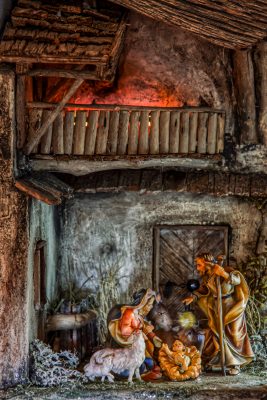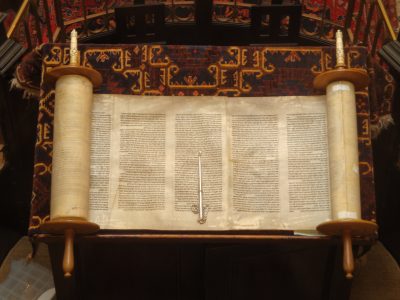×


We have detected your country as:
Please click here to go to the USA website or select another country from the dropdown list.
by: Rev. Rebecca J. Brimmer, International President and CEO
 The birth of Jesus (Yeshua) is one of the single most important events in the history of Christianity. Christians all over the world celebrate Christmas, although some believers are concerned about pagan elements in some of the traditions which have come to typify the celebration of Christmas. Its importance is affirmed by the fact that much of five chapters of the Bible is devoted to details surrounding the event (Matthew 1–2; Luke 1–2; John 1), and the prophets foretold elements surrounding the birth. Interestingly, even the Gregorian calendar measures time since the estimated birth of Jesus. It is an event to be celebrated and honored, as did the hosts of heaven who were sent to give witness to Jesus’ birth. Let’s talk a little bit about what we know from Scripture and what is tradition.
The birth of Jesus (Yeshua) is one of the single most important events in the history of Christianity. Christians all over the world celebrate Christmas, although some believers are concerned about pagan elements in some of the traditions which have come to typify the celebration of Christmas. Its importance is affirmed by the fact that much of five chapters of the Bible is devoted to details surrounding the event (Matthew 1–2; Luke 1–2; John 1), and the prophets foretold elements surrounding the birth. Interestingly, even the Gregorian calendar measures time since the estimated birth of Jesus. It is an event to be celebrated and honored, as did the hosts of heaven who were sent to give witness to Jesus’ birth. Let’s talk a little bit about what we know from Scripture and what is tradition.
The birth of Jesus (Yeshua) is celebrated by different branches of Christianity at different times. The Bible doesn’t tell us the date of the birth. It is most widely celebrated on December 25, but some eastern branches of the Church celebrate on January 6.
According to brittanica.com:
“The church in Rome began formally celebrating Christmas on December 25 in [AD] 336, during the reign of the emperor Constantine. As Constantine had made Christianity the effective religion of the empire, some have speculated that choosing this date had the political motive of weakening the established pagan celebrations. The date was not widely accepted in the Eastern Empire, where January 6 had been favored, for another half-century, and Christmas did not become a major Christian festival until the 9th century.”
December 25 was the celebration of Saturnalia, a pagan holiday, although there is no evidence that Christians of that day were combining worship of pagan gods with the honoring of Jesus’ birth. It may have been an example of accommodation to Roman society, allowing Christians to celebrate the things important to their faith under the radar. Remember that Christians were a persecuted group during parts of the Roman rule.
Rick Lanser, in a well-researched article entitled “Pinpointing the Date of Christ’s Birth,” says:
“In this study we have demonstrated very strong support for the idea that Jesus the Messiah was born on the Sabbath-opening evening of Nisan 1, 6 BC [March 20, 6 BC]. It was a night when Persian astronomers could see the astrologically significant phenomenon of Jupiter, the ‘king’ star, being occulted by the moon as it entered Aries, the constellation signifying Judea. Nisan 1 was the date that God first tabernacled with the Israelites at Sinai, so it was a fitting day for Him to also ‘tabernacle’ with mankind in the person of His Son.”
Another theory is that it occurred during Sukkot (the Feast of Tabernacles). This fits nicely with the Scripture in John, which says, “And the Word became flesh and dwelt among us, and we beheld His glory, glory as of the only begotten of the Father, full of grace and truth” (John 1:14). The Greek word translated “dwelt” can also be translated “tabernacled.”
The timing is not nearly as important as the fact that He came!
Luke tells us that Jesus (Yeshua) was born in a manger because there was no room in the inn. From that one statement, the innkeeper has been vilified throughout history. Have you ever considered that perhaps he was a hero instead? He was a problem-solver! The Scripture tells us that everyone had to go to their ancestral hometown to be registered for the census. Bethlehem was a small village, and everything was full. I imagine every home absorbed family members from out of town. A first-century inn was not like our modern hotels or motels. The first-century inn had one big room. During daytime, it was the place they ate and visited, and at night, everyone rolled out their bedrolls and slept as well as they could in such crowded circumstances. The innkeeper had a full house. There probably wasn’t much room to maneuver between sleepers. He took one look at Mary, who was ready to give birth, and knew it would be extremely uncomfortable for her and everyone else to bring her into the room. So, he found a warm, private place for her and Joseph to bring Jesus into the world. By the way, it wasn’t a wood stable, but a cave. And the manger would have been carved from stone.
Another theory says that it is possible that it wasn’t an inn at all. The Greek word (kataluma) used by Luke could also be translated as guest chamber, which could be found in larger homes.
The important thing to remember is that He was born in Bethlehem, as foretold by the prophet Micah.

It has been said that the shepherds were among the lowest in society; that they smelled bad, and people shied away from contact with them. While that may be true in some contexts, it is possible that the shepherds who were chosen to be among the first to visit Jesus (Yeshua) were highly qualified shepherds raising the lambs that would be sacrificed in the Temple. Bethlehem was a small village with surrounding fields, and was very close to Jerusalem. We know from Jewish writings that lambs destined for sacrifice were raised in Bethlehem and surrounding areas. The lambs had to be without any blemishes. This required much more oversight than normal shepherding. Isn’t it wonderful to think of Jesus being seen by the very ones who may have been inspecting prospective sacrificial lambs?
What an honor to have an angelic visitation announcing the birth of the Messiah. We don’t know if the angels were singing—that is tradition. The Scripture tells of an angelic announcement and a multitude praising God. “And behold, an angel of the Lord stood before them, and the glory of the Lord shone around them, and they were greatly afraid. Then the angel said to them, ‘Do not be afraid, for behold, I bring you good tidings of great joy which will be to all people. For there is born to you this day in the city of David a Savior, who is Christ the Lord [Messiah]’” (Luke 2:9–11). Verses 13 and 14 go on to say, “And suddenly there was with the angel a multitude of the heavenly host praising God and saying: ‘Glory to God in the highest, and on earth peace, goodwill toward men!”
I grew up hearing that there were three wise men who were Asian, perhaps from China. The Bible says that there were wise men who came from the East, but it doesn’t say how far east! It also doesn’t say there were three of them. We assume three because there were three gifts. Perhaps there were three kinds of gifts and many more wise men. We simply don’t know.
The word for wise men in Hebrew is chachamim. Jewish author Barbara Binder Kadden, RJE, says, “Chachamim translates as ‘sages’ and usually refers to the rabbis of the Talmud [rabbinic commentary on Jewish tradition and the Hebrew Scriptures]. The word chachamim is the plural form of chacham, coming from the Hebrew root ‘chet–chaf–mem’ meaning wisdom.”
When Ezra and Nehemiah spearheaded the return of the Jews from Babylon, only about 50,000 returned. The rest stayed in exile. Babylon was later overtaken by Persia. Many Jewish people lived in this region to the east of Israel throughout the following centuries. Later, some of the Jewish sages in these areas compiled the Talmud, which is called the Babylonian Talmud.
Is it possible that the wise men were learned Torah (Gen.–Deut.) scholars or sages from Persia?

Luke brings out elements of the faith life of Jesus’ (Yeshua’s) parents that Matthew omits. Perhaps this is because Matthew was writing to a Jewish audience and Luke to a Greek man. Matthew’s audience would have automatically known details that would have been culturally foreign to Theophilus. In Luke 2:21–24, Luke tells us that Jesus was circumcised on the eighth day and that Mary observed the days of purification an additional 33 days after the circumcision. He also mentions the special significance of a firstborn male and tells of them bringing a sacrifice to the Temple of two young pigeons or turtledoves. All of this is fulfillment of the Torah laws found in Leviticus 12:2–8. These details let the reader understand that the family were Torah-observant Jews who kept every detail as prescribed in the Torah. We also understand that they were not wealthy at this point because they didn’t offer a lamb, but rather two birds (the less expensive option).
Luke 2:39 sums up this part of the story by saying, “So when they had performed all things according to the law of the Lord, they returned to Galilee, to their own city, Nazareth.” So approximately 40 days after the birth of Jesus (Yeshua), the little family left Bethlehem and Jerusalem and returned to Nazareth, and they had not yet received the wealth that was given to them by the wise men.
Our tradition tells us that the wise men came to Bethlehem, but it is more likely that they came to Nazareth. We assume they went to Bethlehem because Herod told them the Scripture says that the Messiah would be born there. However, what does the Scripture say? “When they heard the king, they departed; and behold, the star which they had seen in the East went before them, till it came and stood over where the young Child was. When they saw the star, they rejoiced with exceedingly great joy. And when they had come into the house, they saw the young Child with Mary His mother, and fell down and worshiped Him” (Matt. 2:9–11a). The wise men didn’t follow Herod’s advice; rather, they followed the star! They found baby Jesus in a house, not in a stable or cave. The Scripture goes on to say that they were warned in a dream not to return to Herod. Meanwhile Herod, who was always paranoid, proceeded to kill all baby boys in Bethlehem two years old and under to eliminate the threat of a legitimate Jewish leader.
I hope that you have enjoyed this teaching letter. For me the important message is that God cared enough to send His son to a hurting world. He came as an innocent baby. His birth was announced in miraculous ways, His family were God- and Torah-honoring Jews, and His birth was a big deal to God the Father and the heavenly hosts. Let’s not get so upset about traditions and pagan influences throughout history that we ignore the biblical truths we see in the incarnation. Celebrate whenever you want, but don’t ignore the fact that He came.
Special thanks to my husband, Dr. Thomas J. Brimmer, who always brings out special understanding about the birth of Jesus (Yeshua) for our staff.
Photo Credit: "Click Photo to See Photo Credit"
Britannica, T. Editors of Encyclopaedia. “Why Is Christmas in December?” Encyclopedia Britannica. https://www.britannica.com/story/why-is-christmas-in-december.
“Christmas.” Redeemer of Israel. http://www.redeemerofisrael.org/p/christmas.html
Kadden, Barbara Binder. “To Attend to the Sages—Middah Shimush Chachamim.” ReformJudaism.org. https://reformjudaism.org/learning/sacred-texts/learn-about-middot/attend-sages-middah-shimush-chachamim.
Lanser, Rick. “Pinpointing the Date of Christ’s Birth.” Associates for Biblical Research. May 15, 2019. https://biblearchaeology.org/the-daniel-9-24-27-project-list/4368-pinpointing-the-date-of-christ-s-birth.
Smith, Randall. “Myth and Memory of the Savior’s Birth.” The Wandering Shepherd. https://randalldsmith.com/myth-and-memory-of-the-saviors-birth/.
All logos and trademarks in this site are property of their respective owner. All other materials are property of Bridges for Peace. Copyright © 2025.
Website Site Design by J-Town Internet Services Ltd. - Based in Jerusalem and Serving the World.